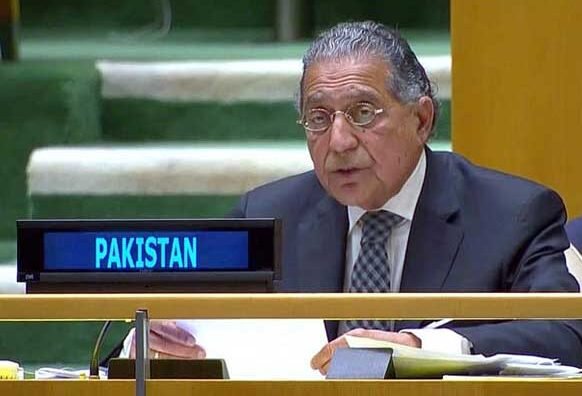New York, 18 March 2024 (TDI): The United Nations General Assembly adopted a resolution on the 15th of March, which is also the International Day to Combat Islamophobia, put forth by Pakistan on behalf of the Organization of Islamic Corporation (OIC).
It called on proposals to combat Islamophobia, which according to the resolution daily “manifests itself at both societal and state levels.”
The UN General Assembly censured the instigation of discrimination, hostility, or violence against Muslims.
This development takes place at a time when there has been a surge in the number of incidents such as the violation of the Holy Quran, attacks on mosques, shrines, and sites including other acts of religious intolerance, harmful stereotypes, hatred, and violence actioned toward Muslims.
Initiation of steps to combat Islamophobia
The UNGA validated the draft titled “Measures to Combat Islamophobia,” (document A/78/L.48) by a vote of 115 in favor, with 44 abstentions and none against.
In addition to this, the Assembly called upon Member States to take obligatory measures, which include legislative and policy steps, to stand against hatred and violence and to forbid by law the provocation of violence against persons based on their religion or belief.
UNGA also appealed to the Secretary-General to appoint a United Nations Special Envoy to combat Islamophobia.
Pakistan’s chief diplomat at the UN, Ambassador Munir Akram, launched the follow-up resolution, stressing the notion that Muslims around the world face discrimination, despite the international acceptance of Islamophobia’s prevalence.
He reported that “Islamophobia is as old as Islam itself…It was generated by atavistic fears and prejudice. It was manifested by the racist colonization and brutalization of much of the Islamic world in the past few centuries.”
Ambassador Munir Akram also discussed that the rising discrimination and religious intolerance became more evident after the September 11, 2001, attacks in New York and Washington.
He also asserted that the continuing war on Gaza and the denial of Western countries to establish a ceasefire are the same part of the problem.
The Pakistani diplomat also emphasized the UN to appoint a special envoy to deal with the global issue of hatred against Muslims and their religion.
He also noted that the Organization of Islamic Cooperation had continuously called for the criminalization of the acts of the deliberate burning of the Holy Quran, that took place seven times last year alone.
Also Read: UN embraces resolution for inter-religious and cultural harmony
Alternative Proposals by Delegations
The representative of Belgium, who introduced the amendments, maintained that anti-Muslim hatred and discrimination are not acceptable and breach the purposes and principles of the UN, as laid down in its charter and the provisions of the Universal Declaration of Human Rights.
However, the representative asserted that “the UN should be religion-neutral.” He also put forth reservations on the creation of a Special Envoy, addressing the duplication of multiple mechanisms in place to shed light on discrimination grounded on religion or belief and its financial consequences.
Moreover, the delegations that abstained from the “L.48” were Argentina, Belgium, Brazil, India, Switzerland, and the United Kingdom.
The representative of Brazil underscored the significance of “fighting discrimination against Muslims, Christians, and Jews on the same footing, without establishing priorities among these phenomena.”
Iran’s Ambassador and Permanent Representative to the United Nations Amir Saeid Iravani, reported that the proposed arrangements in the draft resolution, which also incorporates the decision to appoint a United Nations Special Envoy to stand against religious intolerance, will help the OIC.
Iravani reported that “Despite the best OIC efforts to garner consensus, the member states of the European Union have tabled amendments, which directly affect the core objectives of the draft resolution aimed at combating Islamophobia worldwide.”
The diplomat called on every Member State to share their responsibilities and advance their legal obligations so to put forward the shared values of coexistence, tolerance, and mutual understanding.



